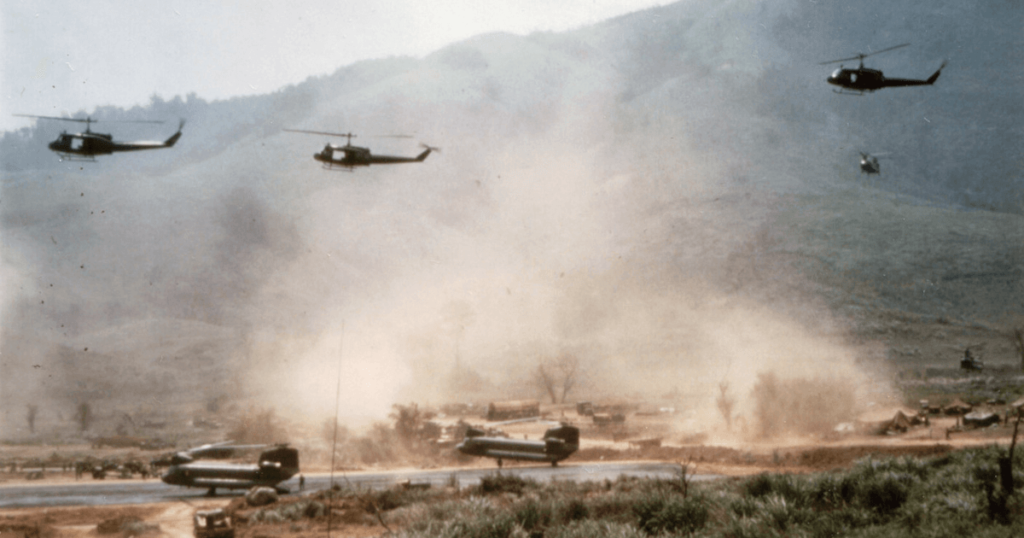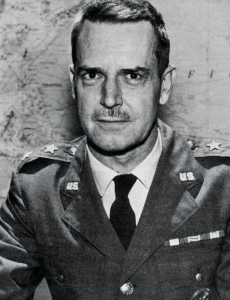
The Road Not Taken: Edward Lansdale and the American Tragedy in Vietnam by Max Boot; Liveright, 768 pp., $35
A half century on, the Vietnam reckoning continues. The recent Ken Burns/Lynn Novick documentary and a yearly tide of books challenge us to think about America’s fateful descent into a war it had every reason to know was a bad idea. And the choices political leaders made—or had forced upon them, by their lights—elicit from historians a fascination with might-have-beens, prophets without honor, roads not taken.
Max Boot’s Cassandra was Edward Geary Lansdale. A California advertising man, he was recruited into the OSS during World War II and served in the CIA, under military cover, through its early Cold War glory days. Boot calls his subject a “covert warrior,” except that covert no more describes Lansdale’s style than collegial or consensual. Only his paymaster remained a secret.
Trim and mustached, artless and idealistic, Lansdale beguiled a generation of politicians, Asian and American, with his plainspoken nostrums for meeting unconventional threats posed by communist insurgencies. He was a patron saint of the hearts-and-minds school of warfare. In 1955, he wrote home from Vietnam, at the dawn of its independence from France, of his “strong feelings about how to fight Communism: by giving the guy in the street or the rice paddy something he can believe in so strongly that he will defend it with everything he has. … It’s old-fashioned Americanism, representative government, an armed force which protects the people as brothers, all men created equal.”
Drawing on his advertising skills, Lansdale gave muscle to his uplifting rhetoric with an inventive array of psy-ops and dirty tricks. Thanks to Lansdale’s knowledge of indigenous superstitions, a combat unit he helped organize terrified Philippine guerrillas into retreat by stringing up the corpse of one of their captured members, drained of blood and bearing bogus tooth marks on the neck.
 American intelligence had sent Lansdale to the Philippines in 1950 to build the government’s intelligence network in its struggle against communist-led guerrillas. He spent three years getting to know the country and becoming known in turn for his harmonica-playing sallies into remote villages. He retailed these yarns in upbeat messages to Washington and in fulsome letters to his American wife, and also to his longtime Filipina mistress, later his second wife. Boot, the first to have access to this well of self-absorbed correspondence, rather too slavishly draws from it.
American intelligence had sent Lansdale to the Philippines in 1950 to build the government’s intelligence network in its struggle against communist-led guerrillas. He spent three years getting to know the country and becoming known in turn for his harmonica-playing sallies into remote villages. He retailed these yarns in upbeat messages to Washington and in fulsome letters to his American wife, and also to his longtime Filipina mistress, later his second wife. Boot, the first to have access to this well of self-absorbed correspondence, rather too slavishly draws from it.
Lansdale’s signature achievement in the Philippines was to befriend and promote a charismatic politician named Ramon Magsaysay, whose 1953 election as president he engineered. Magsaysay claimed to have won 98.2 percent of the vote, a feat that earned Lansdale the nickname “Colonel Landslide” to go with another that trailed him, “the American T. E. Lawrence.”
Lansdale went on to Vietnam in 1954, just as the French were giving up their colony and their bitter war against the Viet Minh, turning both over to American care. There, as head of the U.S. military mission, he bonded with a rising and decidedly uncharismatic politician, Ngo Dinh Diem, and coached him into power. Lansdale took credit (which Boot gives him) for blocking an early move by Secretary of State John Foster Dulles to dump Diem as leader of South Vietnam; whether this was a brilliant rescue of a visionary statesman or a leap into a 20-year quagmire is a matter of reasonable debate. Diem was overthrown, and murdered, in a U.S.-sanctioned coup in 1963, a bitter end for Lansdale’s friend and hopes.
With Lansdale’s guidance and bankroll, Diem met the threat to his own survival—in Vietnam and Washington—by crushing a trio of armed religious sects and criminal gangs that ruled the local economy. The fledgling leader showed a toughness and guile at the outset of his rule that understandably impressed people, and that failed him later. You could say the same of Lansdale.
With the Ngo family installed in power, Lansdale became a contradiction in terms: a celebrity spy. It was said, even by Lansdale, that he had been the inspiration for Graham Greene’s American innocent, Alden Pyle, the eponymous Quiet American. This wasn’t true or even logical, and Greene said so. There is no question, however, that Lansdale turns up in Eugene Burdick and William J. Lederer’s 1958 novel The Ugly American (their protagonist bore an apt middle name and a thinly veiled surname: Edwin Barnum Hillandale), and a shadowy Lansdale-like figure likewise appears in Oliver Stone’s JFK.
Such was his supposed magic that Lansdale was improbably and disastrously recruited to run Operation Mongoose, the CIA effort to destabilize the Castro regime in Cuba after the Bay of Pigs. Lansdale produced “a detailed, if delusional, plan,” admits Boot, that included biological and chemical warfare and “liquidation” of Castro. One of Lansdale’s evanescent psy-ops schemes, a CIA officer later testified, was to surface a submarine near the Cuban coast “and fire star shells in the sky in order to convince Cubans ‘that the second coming of Christ was imminent and that Christ was against Castro.’ ”
Lansdale’s moment, clearly, was behind him. He was damaged goods, not a team player, and a bit of a crank. John F. Kennedy toyed with the idea of naming him ambassador to South Vietnam in 1961—even offered it to him point-blank—but Secretary of State Dean Rusk didn’t want a spook or a soldier in the job and killed the appointment. Kennedy also thought of sending Lansdale to run the military advisory group in Vietnam, but the military didn’t want him. According to Ambassador Henry Cabot Lodge, Kennedy and Johnson both thought of posting him as CIA station chief in Saigon, but that was anathema to CIA hands. Lansdale’s reputation preceded him.
In the 1960s, Lansdale wrote passionate articles about counterinsurgency for Foreign Affairs and long memoranda, described by Boot as often “more anthropological than political,” to anyone who would read them. He joined Vietnam task forces and went on special fact-finding missions. Eventually, in 1965, Ambassador Lodge brought Lansdale to Saigon to run, for a dispiriting two and a half years, an ill-defined rural pacification program on the sidelines of a deepening war.
“Like many visionaries before him, Lansdale was better at generating ideas than at implementing them,” Boot writes candidly. A Lyndon Johnson aide, John P. Roche, was tougher, dismissing Lansdale after a 1967 visit to Saigon as “a public nuisance who has been waiting around in an alcoholic haze for the Second Coming of Magsaysay. Spends most of his time explaining to visiting firemen that if he had been listened to, the war would be over—and that he has been responsible for whatever progress we have made.”
Roche’s scalding caricature is uncomfortably close to the if-only posited by this biography. Boot, a noted military historian and specialist in guerrilla warfare, declares: “It is no exaggeration”—or is it?—“to suggest that the whole conflict, the worst military defeat in American history, might have taken a very different course—one that was less costly and potentially more successful—if the counsel of this CIA operative and Air Force officer had been followed.”
Lansdale’s “insights,” as Boot is wont to call them, were not all that unconventional or even exclusively his own. Far from being ignored, they had been absorbed into official thinking. They were behind the very pressures Washington put on Diem, in vain, throughout his presidency—and on autocrats the United States has supported, usually out of strategic necessity, ever since: to open the political process, to be closer to the people, to match guns with butter, to free the press and build civil society, to trust democracy to work. This was the Lansdale playbook. It was just easier said than done.


